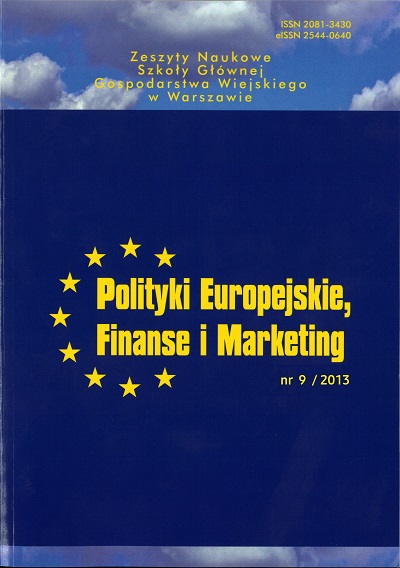Main Article Content
Article Details
Babbie E.: Badania społeczne w praktyce, PWN, Warszawa 2004.
Baxter S.: Exploring children's attitudes towards research participation, International Journal of Market Research, Vol. 5, 4/2012. (Crossref)
BaxterS.: It's not kids' play! Reflecting on the child-orientated research experience, International Journal of Market Research, Vol. 53, 1/2011. (Crossref)
Birbeck D. J.: Drummond M.J.N.: Research with Young Children: Contemplating Methods and Ethics, Journal of Educational Enquiry, Vol. 7 2/2007.
Brzezińska, A.: Psychologiczne portrety człowieka. Praktyczna psychologia rozwojowa, GWP, Gdańsk 2000.
Calvert S.L.: Children as Consumers: Advertising and Marketing, The Future of Children, Vol. 18, 1.2008. (Crossref)
Hoppe M.J., Wells E.A., Morrison D.M., Gillmore M.R., Wilsdone A.: Using focus groups to discuss sensitive topics with children, Evaluation Review, 19/1995. (Crossref)
Kraak V., Pelletier D.L.: How Marketers Reach Young Consumers: Implications for Nutrition Education and Health Promotion Campaigns, Family Economics & Nutrition Review, Vol. 11,4/1998.
Papalia D.E., Wendkos O.S.,: Human Development, McGrow-Hill Book Comapany. 1986.
Rust L., Hyatt C.: Qualitative and Quantitative Approaches to Child Research, Advances in Consumer Research, 18/1991.
Sowa I.: Metody badań marketingowych dzieci i młodzieży, Prace Naukowe Akademii Ekonomicznej we Wrocławiu, nr 1004/2003.
Vasta R., Haith M., Miller S.A.: Psychologia dziecka, WSIP; Warszawa 2004.
Ipsos, Dzieci i pieniądze: kieszonkowe nie poddaje się kryzysowi, Internet: http://www.ipsos.pl/kieszonkowe-dzieci-2010 [15.07.2013].
Downloads
- Agata Matuszewska, The impact of social advertising and the system of its audience , The Scientific Journal European Policies, Finance and Marketing: No. 9(58) (2013)
You may also start an advanced similarity search for this article.

This work is licensed under a Creative Commons Attribution-NonCommercial 4.0 International License.
All articles published in European Policies, Finance and Marketing are fully open access. In this way, the scientific research results contained in articles published in our journal are available to every reader free of charge - in accordance with the CC BY-NC license (https://creativecommons.org/licenses/by-nc/4.0/).
According to the CC BY-NC license you are free to:
- Share — copy and redistribute the material in any medium or format
- Adapt — remix, transform, and build upon the material
The licensor cannot revoke these freedoms as long as you follow the license terms.
Under the following terms:
- Attribution — You must give appropriate credit , provide a link to the license, and indicate if changes were made . You may do so in any reasonable manner, but not in any way that suggests the licensor endorses you or your use.
- NonCommercial — You may not use the material for commercial purposes .
- No additional restrictions — You may not apply legal terms or technological measures that legally restrict others from doing anything the license permits.
Source: https://creativecommons.org/licenses/by-nc/4.0/deed.en
According to that, the authors retain the copyright and full publishing rights.





